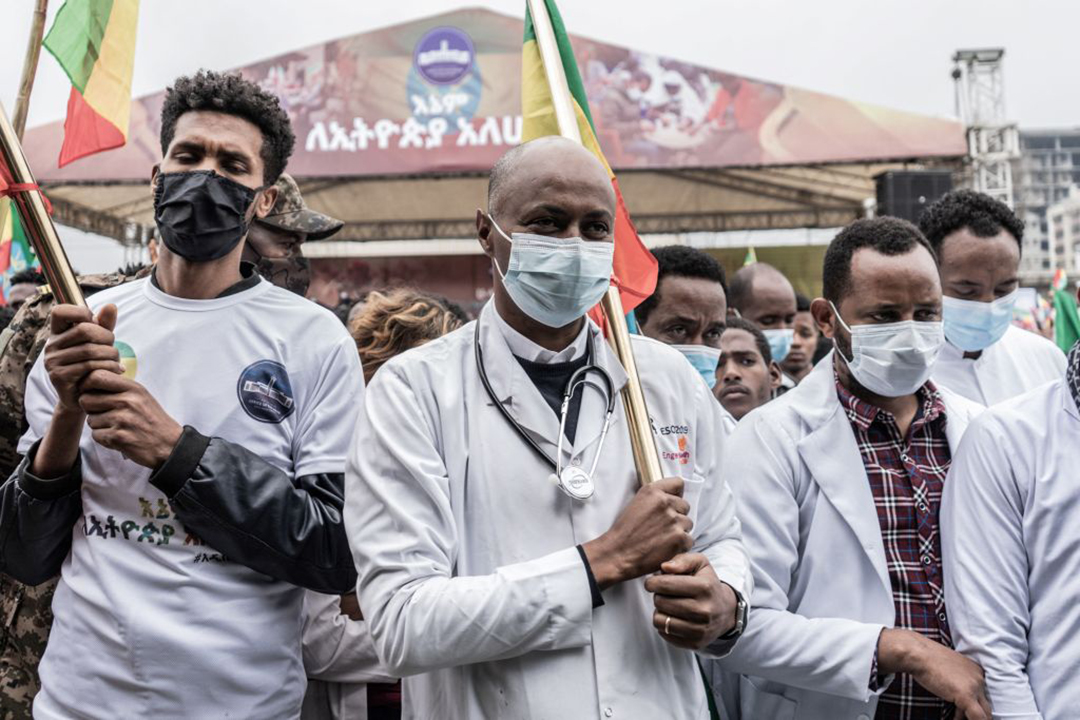Conflicts Impede War on COVID-19
ADF STAFF
Based in Ethiopia’s capital, Addis Ababa, Dr. John Nkengasong works near one of the world’s deadliest conflicts.
Despite a national state of emergency, the fighting has not impacted the day-to-day operations of the Africa Centres for Disease Control and Prevention (Africa CDC), he said in his November 11 news conference.
But the impact of conflict on the COVID-19 pandemic is of grave concern to the virologist and Africa CDC director.
“I always say instability breeds disease outbreaks, and disease outbreaks breed instability — the two go hand in hand,” he said. “Whenever you get insecurity, instability in a region, in a country, it takes longer than it is expected to control the pandemic.”
The yearlong war in Ethiopia has caused a humanitarian disaster for 5.2 million people in the northern region of Tigray. The World Health Organization (WHO) reports that more than half the region’s health facilities are not operational.
More than 2.1 million Tigrayans also have been displaced and are living in crowded settings. A United Nations situation report early in 2021 expressed concern that the movements of the refugees “is feared to have facilitated massive community transmission of the pandemic.”
Confirmed cases have been going down since the third wave of COVID-19 peaked in late September, but testing has been severely lacking since the conflict began.
Health officials have long seen the way conflict and disease operate together. During the 2018 Ebola outbreak in the eastern region of the Democratic Republic of the Congo (DRC), the response was constantly threatened by armed rebel groups.
“It took us almost two years to bring that outbreak to closure because of the instability,” Nkengasong said. “WHO staff were killed. Some of our own Africa CDC staff were brutalized. It took so long.”
Nkengasong said it took fewer than three months to quell a more recent Ebola outbreak in the more stable western DRC.
A September 2020 study published in the British Medical Journal examined the impact of a violent Islamist insurgency on tuberculosis cases in Nigeria’s northeast region. It showed “areas affected by conflict had decreased case notification, while neighboring areas reported increased case notifications.”
In another active conflict zone, Mozambican Health Minister Armindo Tiago recently said his ministry is on high alert for another spike in cases.
“The conditions for the eruption of a new wave are still present,” he warned at a public ceremony on November 12. “So, we must be prepared for a possible fourth wave.”
In July 2021 in South Africa, widespread unrest was so tied to the spread of coronavirus that one health official called it a “superspreader event.”
Violence erupted while the country was in the grips of its third and most severe wave of COVID-19.
“We are concerned about the last three or so days of rioting in some parts of South Africa — it may exacerbate the situation of a very severe wave,” WHO Africa Director Matshidiso Moeti said in a July 15 news briefing. “The government has to brace itself, and we in the WHO will be preparing to see an increase in the cases again.”
Instability on the continent is causing a deadly ripple effect. People are displaced, infrastructure destroyed, and finances and attention are diverted with health care systems pushed to their limits.
“Each time there is instability or crisis it provides an opportunity for public health experts and health workers not to do their jobs,” Nkengasong said. “It becomes very difficult to contain the virus. It’s that simple and straightforward.
“We can only win the battle against this virus if we work in a totally safe environment.”


Comments are closed.